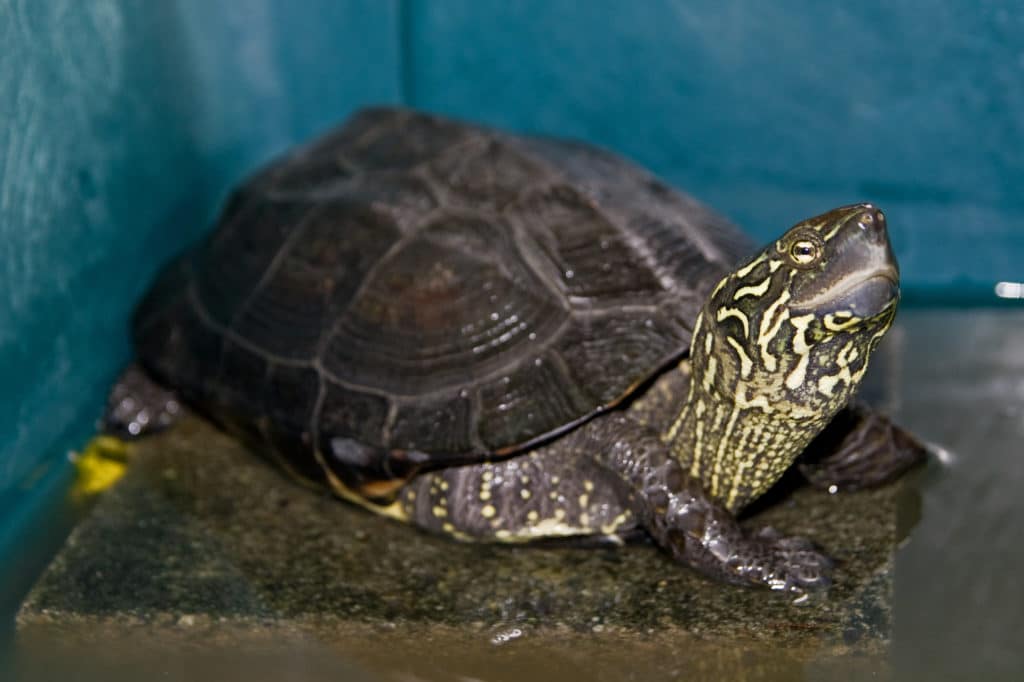Chinese-Australian research finds climate change good news, and solves an evolutionary mystery

Image credit: Wikimedia Commons
Baby turtles influence their gender by moving around inside their eggs, research has revealed.
The idea that an embryo reptile can act in a way that affects its chances of developing as male or female has long been thought impossible, but findings by scientists from China and Australia have now provided clear proof of the process.
The research, published in the journal Current Biology, solves a long-standing evolutionary mystery – and offers hope that at least some species thought especially vulnerable to effects of climate change will prove more robust than thought.
To carry out their work the scientists, led by Wei-Guo Du from the Chinese Academy of Science in Beijing and including Macquarie University biologist Rick Shine, incubated several clutches of eggs laid in semi-natural nests by a species of freshwater turtle, Mauremys reevesii.
Like those of many other reptiles, the eggs of the turtle are crucially dependent on the temperature of the nest. It has long been known that warmth influences gender in such species – a condition known as temperature-dependent sex determination, or TSD.
The prevalence of TSD has raised fears for the survival of many reptile species as global warming bites. When temperatures rise, scientists suggest, the usual 50-50 gender ratio will be heavily skewed, reducing reproduction rates to unsustainable levels.
Not all the evidence, however, leads to the same conclusion – a fact that led Du, Shine and colleagues to investigate.
“Reconstruction of the ancestral lineages of many TSD species shows that they have survived for millions of years,” says Shine, “including during periods where the average temperatures were much hotter than current climate change models predict.”
Although maternal behaviours such as changing egg-laying times and altering nest structures to avoid the hottest times of the year might explain part of this stubborn survival, adult reptiles are powerless to protect their developing young from temperature changes once the eggs have been laid.
To find out, thus, whether turtle embryos were influence their own genders the researchers manipulated conditions affecting M. reevseii eggs.
They found that when warmed by a heat source set at an angle each egg developed a significant thermal gradient, becoming warmer at one end. The embryos then moved inside the eggs in response. Those that shifted toward the warmer end developed into females, while those heading into the cold became male.
The researchers suspected that the embryos were detecting the temperatures through inbuilt bio-sensors called ion channels. To test this, they administered a drug which blocked ion activity, but did not otherwise affect the health of the animals.
They found that the treated embryos did not move as far as untreated ones, and that sex ratios quickly became skewed. In cold conditions, almost all the turtles turned out male, with females dominating at higher temperatures.
“The discovery that embryos can influence their own development is truly remarkable,” says Shine.
He adds that the findings constitute a rare “good news” story about conservation.
“Turtles are in desperate trouble all over the world – for example they are eaten in Asia, and their habitats are being destroyed by short-sighted management of river systems in Australia,” he explains.
“It’s encouraging to know that turtles may be better than we expected at dealing with some of the challenges wrought by climate change.”
For co-author Wei-Guo Du, the research provided a vindication of earlier work. A previous study by his team suggesting that movements by turtle embryos were triggered by temperature zones within eggs received a sceptical reception by some other scientists in the field. The new findings reinforce his initial conclusions.
“We previously demonstrated that reptile embryos could move around within their egg for thermoregulation, so we were curious about whether this could affect their sex determination,” he says.
“We wanted to know if and how this behaviour could help buffer the impact of global warming on offspring sex ratios in these species.”
Six of the seven scientists collaborating in the study are based in China – a fact, says Shine, that demonstrates the strength of the research community in that country.
“Ecological and evolutionary research is flourishing in China, backed by substantial government investment and driven by a new generation of young Chinese scholars,” he says.
“Increasingly, some of the best research about critical issues like climate change is coming from China.”
The paper can be found here.

